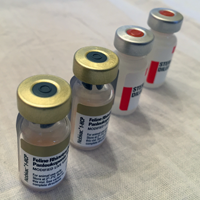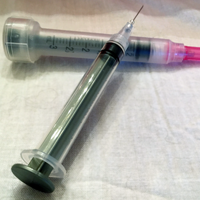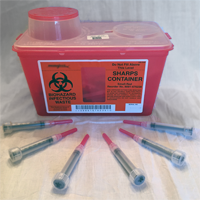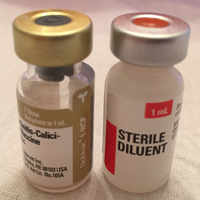Cat & Kitten Vaccines
ABC's of Cat Vaccines
Cat vaccines come in a variety of combinations and may be identified by letters. Below is a handy guide to determining which letters need to be in your vaccines.
Note: The materials, information and answers provided through this website are not intended to replace the medical advice or services of a qualified veterinarian or other pet health care professional. Consult your own veterinarian for answers to specific medical questions, including diagnosis, treatment, therapy or medical attention.
"FVR": Feline Viral Rhinotracheitis. This is a contagious disease of the respiratory tract that is caused by the herpes virus. Common symptoms include eye ulcers, congestion of the nose and sinuses, fever, or loss of appetite. Cats that are extremely dehydrated or anemic may die from this disease. Even if a cat survives, they will be a carrier of the disease for the rest of their lives, so vaccination for FVR is highly recommended.
"C": Calicivirus. Another contagious respiratory disease, calicivirus may be difficult to distinguish from other respiratory infections. In addition to other common eye & nasal symptoms, it can also cause ulcers of the mouth or joint & muscle pain. Severe cases may also lead to death, especially in young kittens. An infected cat will be a carrier for the rest of their life and continually shed the virus for years.
"P", "FPV", "FP": Feline Panleukopenia. This widespread disease is similar to canine distemper. Highly contagious, it invades developing cells and corrupts the white blood cells so the cat is unable to fight off infection. Symptoms are sudden and include fever, diarrhea, vomiting, seizures or death, especially in unvaccinated kittens. The only treatment is supportive therapy of the symptoms, so vaccination is important.
Chlamydia is the fourth component of 4-way vaccines, though it's not abbreviated. Often called "cat pinkeye," it causes a variety of upper respiratory symptoms such as sneezing, congestion and eye & nasal discharge. Cats living in multiple cat locations are more susceptible to the disease, so vaccination is not always necessary for every cat. Talk with your veterinarian for recommendations.
"FELV", "FeLV", "LVK", "LV-K": Feline Leukemia Virus. Feline leukemia is caused by a virus that replicates in the cat's body and attacks the immune system, causing cancers and other immunodeficiencies. Symptoms may include fever, lethargy, diarrhea, or loss of appetite, and eventually death. Vaccination is not necessary for every cat, so check with your veterinarian first.
3: Any vaccine with a 3 in the title contains the rhinotracheitis, calicivirus and panleukopenia viruses.
4: Any vaccine with a 4 in the title contains the rhinotracheitis, calicivirus, panleukopenia and chlamydia viruses.
Modified Live Vaccines vs. Killed Vaccines
A killed (inactivated vaccine) eliminates the chance for an infection from the vaccine virus or bacteria. A killed vaccine does not usually produce as good immunity as an MLV, and therefore, may contain an adjuvant and require two doses. Using an adjuvant can increase the potential for a local or allergic reaction.
Modified live vaccines tend to give a better immunity because the virus or bacteria is actually multiplying in the dog or cat, providing greater stimulation to the immune system. MLV vaccines will also tend to begin to provide protection sooner!
Important Note: The materials, information and answers provided through this website are not intended to replace the medical advice or services of a qualified veterinarian or other pet health care professional. Consult your own veterinarian for answers to specific medical questions, including diagnosis, treatment, therapy or medical attention.
Heavnzsent Cattery, LLC - Shelly Finley
N62W37794 Wadebridge Road - Oconomowoc, WI 53066 USA
- Home | About Us | Hypoallergenic | Siberian Kittens | Siberian Cats | Photo Galleries | Contact | Site Map | Blog (coming soon)




